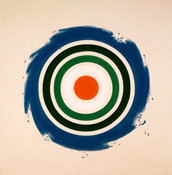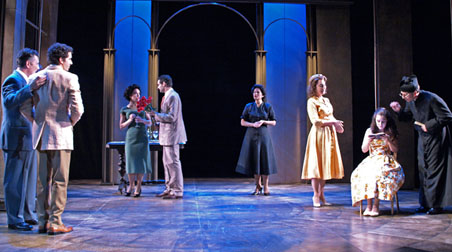Into every blog a little chaos must occasionally fall, but never before have all three of us been under the crunch at one and the same time. On Sunday Terry and Mrs. T hit the road for a solid month of out-of-town reviewing. Laura will soon be departing Chicago for a couple of weeks, and Carrie is currently snowed under with cash-generating work.
Needless to say, none of this means that we’re closing up shop. There’ll always be a daily almanac entry, a Wednesday “Snapshot,” and the usual theater-related postings on Thursdays and Fridays. Nevertheless, regular readers should be forewarned that things are likely to be a bit spotty around here from now until the end of August. All three of us will post as often as we can, which might end up being more often than we expect, but we don’t want to make any unkeepable promises.
In short, expect no miracles, but do keep looking in on us–you’ll never go away completely empty-handed. And enjoy your summer!
Archives for July 2008
TT: Neither crunchy nor thumpy
 My friend Ethan Iverson, who plays piano with the Bad Plus, read my recent Wall Street Journal column on modern music, in which I mentioned in passing that “I don’t go in for crunch-and-thump music, nor do I care for the over-and-over-and-over-again minimalism of John Adams and Philip Glass, which puts me to sleep.” He promptly issued the following challenge on his blog:
My friend Ethan Iverson, who plays piano with the Bad Plus, read my recent Wall Street Journal column on modern music, in which I mentioned in passing that “I don’t go in for crunch-and-thump music, nor do I care for the over-and-over-and-over-again minimalism of John Adams and Philip Glass, which puts me to sleep.” He promptly issued the following challenge on his blog:
Here’s an open invitation to Terry–who, after all, is a current collaborator with modernist composer Paul Moravec: what about a list of classical music since 1950 that he finds interesting? It should be a list of music that is neither twelve-tone or minimalist, nor particularly “crunch and thump.”
Here goes, straight off the top of my head. I’ve included links to currently available recordings of all ten pieces, which can also be downloaded from iTunes:
• Benjamin Britten, The Turn of the Screw (1954)
• Aaron Copland, Piano Fantasy (1957)
• Ned Rorem, Trio for Flute, Cello, and Piano (1959)
• Leonard Bernstein, Chichester Psalms (1965)
• Dmitri Shostakovich, String Quartet No. 11 (1966)
• Malcolm Arnold, Symphony for Brass Instruments (1978)
• George Tsontakis, String Quartet No. 3 (“Coraggio”) (1986)
• Morten Lauridsen, O Magnum Mysterium (1994)
• Lowell Liebermann, Piccolo Concerto (1996)
• Paul Moravec, The Time Gallery (2000)
Each of these pieces is more or less tonal (though Britten’s opera and the Copland Fantasy also make use of serial-type techniques). Beyond that, though, they don’t have a lot in common other than that I happen to like them all very much. Some are immediately accessible, while others are tougher nuts to crack. I chose them to suggest the breadth of musical possibility that has been available to postwar classical composers whose language is essentially traditional.
TT: Almanac
“Gerald Middleton was a man of mildly but persistently depressive temperament. Such men are not at their best at breakfast, nor is the week before Christmas their happiest time.”
Angus Wilson, Anglo-Saxon Attitudes
CD
Cy Walter, Rodgers Revisited: Cy Walter Plays Richard Rodgers Compositions (Collectables). Two years after I heralded the first CD reissue of the long-forgotten recordings of Cy Walter, the man who turned cocktail piano into an art, a sequel has finally come along. Walters’ 1956 recital of thirteen songs by Richard Rodgers, originally released by Atlantic, is as suave and elegant a display of piano playing as has ever been committed to disc–but don’t be fooled by the high gloss. Alec Wilder said in his original liner notes that “anyone who has heard his own songs played by Cy immediately has a greater respect for his own work….though utterly respectful of the composers and songwriters whose music he plays, he is also highly complex both rhythmically and harmonically in his interpretations of their music, all the while maintaining a constant balance of delicacy and sensitiveness.” Listen to “The Gentleman is a Dope” and you’ll hear what Wilder meant. More, please! (TT).
TT: Fret not
I’m pleased (and not a little relieved) to announce that www.terryteachout.com, the alternate URL for “About Last Night,” has been repaired at last and is functioning once more. If you’re in the habit of using that easy-to-remember address instead of www.artsjournal.com/aboutlastnight, our official URL, you may now return to your old ways.
Sorry about that.
TT: Songs of themselves
Today’s Wall Street Journal drama column features three musicals, one on Broadway and two out of town: [title of show], a Vermont production of The Light in the Piazza, and an Oklahoma! in upstate New York. Here’s an excerpt.
* * *
The ultimate backstage musical–and I don’t mean that as a compliment–has come to Broadway. “[title of show]” is a show about itself, a 90-minute mini-musical whose authors, Jeff Bowen and Hunter Bell, play themselves and whose subject is how the show in which they are appearing came to be written and produced. If all this sounds claustrophobically self-indulgent, there’s a reason: I don’t know when I’ve seen a musical that seemed more pleased with itself.
Art about art usually is self-indulgent, but it doesn’t have to be–so long as its self-reflexiveness has wider implications. The first two-thirds of “[title of show]” fails to pass that test. It basically amounts to one long inside joke about theater, a daisy chain of glib references to moldy Broadway flops (anybody who can remember “Censored Scenes from King Kong” needs to run right out and get a life) and stale postmodern gimmickry (it is not clever to shout “Key change!” when the song you’re singing changes keys). A full hour crawls by before “[title of show]” cuts out the coyness and gets serious….
 Everything missing from “[title of show]” is present in abundance in Adam Guettel’s “The Light in the Piazza,” which has just been revived by the Weston Playhouse Theatre Company in a brand-new chamber version for eight actors and five musicians. (The original version calls for 18 actors and 15 musicians.) Mr. Guettel has shrunk the show’s scale without diminishing its passionate romanticism–if anything, it plays better this way–and I won’t be at all surprised if the new “Piazza” becomes the standard performing version of the first great musical of the post-Sondheim era.
Everything missing from “[title of show]” is present in abundance in Adam Guettel’s “The Light in the Piazza,” which has just been revived by the Weston Playhouse Theatre Company in a brand-new chamber version for eight actors and five musicians. (The original version calls for 18 actors and 15 musicians.) Mr. Guettel has shrunk the show’s scale without diminishing its passionate romanticism–if anything, it plays better this way–and I won’t be at all surprised if the new “Piazza” becomes the standard performing version of the first great musical of the post-Sondheim era.
It helps, of course, that this intimate production, directed with intelligence and grace by Steve Stettler, is so very fine. In certain ways Mr. Stettler’s “Piazza” is actually superior to Lincoln Center Theater’s 2005 Broadway production…
Richard Rodgers, Mr. Guettel’s grandfather, was a pretty fair tunesmith himself, and many of his shows profit from the same intimate treatment that the Weston Playhouse is giving to “The Light in the Piazza.” I’m not altogether sure that “Oklahoma!” is one of them, but the Hangar Theatre’s small-scale revival of the most enduringly popular of the five hit musicals that Rodgers wrote with Oscar Hammerstein II is still an unpretentiously likable piece of work….
* * *
Read the whole thing here.
TT: Hating the new
Joe Queenan, who can be a very funny man, published a piece in the Guardian last week in which he declared himself to be unalterably opposed to modern music of all kinds:
In New York, Philadelphia and Boston, concert-goers have learned to stay awake and applaud politely at compositions by Christopher Rouse and Tan Dun. But they do this only because these works tend to be short and not terribly atonal; because they know this is the last time in their lives they’ll have to listen to them; and because the orchestra has signed a contract in blood guaranteeing that if everyone holds their nose and eats their vegetables, they’ll be rewarded with a great dollop of Tchaikovsky and Mendelssohn.
My editor at The Wall Street Journal sent me a link to Queenan’s piece, accompanied by the suggestion that I might possibly want to write a “Sightings” column about “Admit It, You’re as Bored as I Am.” Boy, was he ever right. Pick up a copy of Saturday’s Journal and see what came of it.
UPDATE: Read the whole thing here.
TT: Almanac
“A good stylist should have narcissistic enjoyment as he works. He must be able to objectivize his work to such an extent that he catches himself feeling envious and has to jog his memory to find that he is himself the creator. In short, he must display that highest degree of objectivity which the world calls vanity.”
Karl Kraus, Beim Wort genommen (trans. Harry Zohn)
